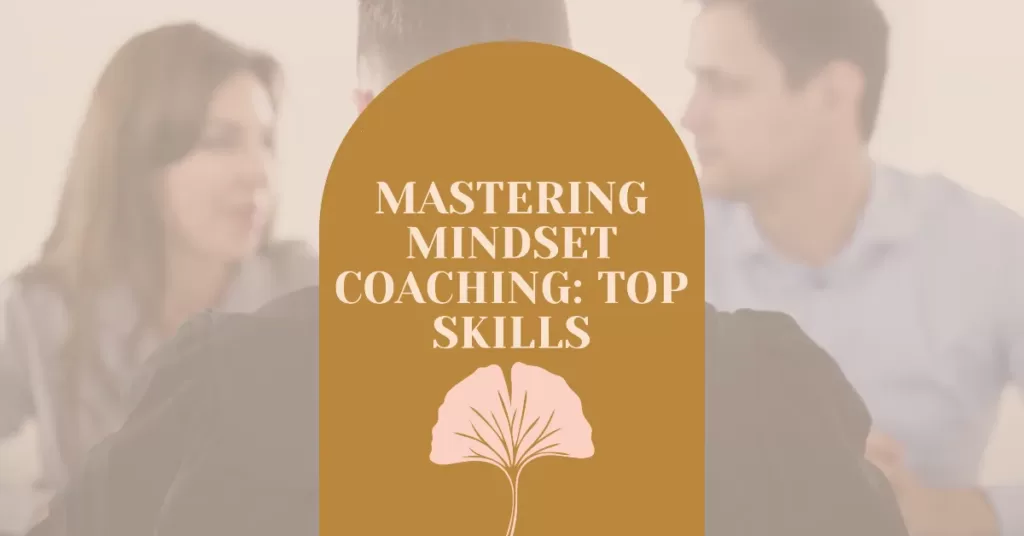If you’re interested in becoming a mindset coach, it’s essential to know what skills are most useful for helping your clients achieve their goals. While there are many different approaches to coaching, certain skills have consistently proven effective in transforming people’s mindsets and unlocking their full potential.
One of the most important things you can do as a mindset coach is asking powerful questions. This involves using open-ended questions that encourage your clients to explore their thoughts and feelings more deeply. By asking thought-provoking questions, you can help your clients gain new insights into themselves and their beliefs, which can ultimately lead to positive change. In this article, we’ll explore some more of the other key mindset coaching skills that can help you become an effective coach and transform lives.
Table of Contents
Key Takeaways
- Asking powerful questions encourages clients to explore their thoughts and feelings;
- Mindfulness practice reduces stress, improves focus, enhances emotional regulation, and increases wellbeing;
- Positive psychology focuses on building strengths and cultivating positive emotions, which can increase feelings of happiness and contentment and build resilience against adversity;
- Goal setting and action planning are important for achieving success and personal growth and require self-reflection and consideration of values, passions, strengths, and weaknesses.
Asking Powerful Questions
Want to know the secret to becoming a great mindset coach? Master the art of asking powerful questions! This is one of the most useful mindset coaching skills that you can develop. Asking powerful questions allows you to help your clients gain clarity and insight into their own thoughts, beliefs, and behaviors.
Asking powerful questions means going beyond simply asking open-ended questions. It involves asking thought-provoking questions that challenge your clients’ assumptions and beliefs. These types of questions can encourage your clients to think deeply about their situation and consider different perspectives. Powerful questions can also help your clients identify their goals, values, and priorities.
When you ask powerful questions, it’s important to be present and fully engaged with your client. Listen carefully to their responses and ask follow-up questions as needed. Be empathetic and non-judgmental in your approach. Remember that the goal is not to provide answers or solutions for your client, but rather to guide them toward discovering their own solutions.
Asking powerful questions takes practice, but it’s a skill that can greatly benefit both you and your clients. By mastering this skill, you’ll be able to facilitate more meaningful conversations with your clients and help them achieve greater self-awareness and personal growth. So start practicing today – ask yourself what kind of powerful question could change someone’s life, then go out there tomorrow ready for action!
Active Listening
As you dive into the world of mindset coaching, make sure to open your ears wide and truly hear what your clients are saying, for active listening is like a musical symphony that harmonizes all aspects of communication. Active listening means not only hearing the words being spoken but also understanding the emotions behind them. It involves paying attention to both verbal and nonverbal cues, such as body language, tone of voice, and facial expressions.
To become an expert in active listening, it’s important to develop certain skills. First on the list is empathy – putting yourself in your client’s shoes and feeling what they feel. This helps you understand their perspective better and build trust with them. Second is patience – allowing your client to express themselves fully without interrupting or rushing them. Third is focus – giving undivided attention to your client’s words rather than thinking about what you’ll say next. Finally, feedback – paraphrasing what you’ve heard back to the client shows that you’re actively engaged in the conversation.
Active listening can help clients feel heard and validated while also providing coaches with valuable insights into their concerns. By tuning into verbal and nonverbal cues during a conversation, coaches can get a deeper understanding of their clients’ thoughts and feelings. This allows them to tailor their coaching style accordingly, making it more effective.
Active listening is an essential skill for any mindset coach looking to make a real difference in their clients’ lives. With empathy, patience, focus, and feedback at its core, this technique allows both coach and client alike to engage in meaningful conversations that promote growth and change. So start honing those listening skills today – your clients will thank you for it!
Mindfulness Practice
Practicing mindfulness is a powerful tool that allows you to fully immerse yourself in the present moment, cultivating a sense of peace and calm within. It involves paying attention to your thoughts, feelings, and bodily sensations without judgment. Mindfulness practice has been shown to have numerous benefits such as reducing stress and anxiety, improving focus and concentration, enhancing emotional regulation, and increasing overall wellbeing.
To understand how practicing mindfulness can benefit your life, let’s take a look at this table:
| Benefits of Mindfulness Practice | Examples |
|---|---|
| Reduced stress | Lower cortisol levels |
| Improved focus | Better performance at work or school |
| Enhanced emotional regulation | Less reactive in difficult situations |
| Increased overall wellbeing | Mental clarity and improved mood |
As you can see from the examples above, practicing mindfulness has several tangible benefits that can improve various aspects of your life. By being more aware of your thoughts and emotions without reacting impulsively or judgmentally to them, you gain greater control over your mental state.
One way to incorporate mindfulness into your daily routine is through meditation. Meditation involves focusing on your breath or a specific object while observing any arising thoughts or emotions without getting caught up in them. With regular practice, you’ll find it easier to stay present in the moment even when faced with challenging situations.
Incorporating mindfulness practice into your daily routine is an effective way to cultivate inner peace and enhance various areas of your life. By being more aware of our thoughts and emotions without judgment or reactivity toward them we gain greater control over our mental states leading ultimately toward freedom from negative thought patterns or behaviors that may hold us back from living our best lives!
Positive Psychology
You can improve your overall wellbeing by incorporating positive psychology principles into your daily life. Positive psychology is the scientific study of human flourishing and focuses on building strengths and cultivating positive emotions to enhance our lives.
Here are three ways you can practice positive psychology:
- Gratitude: Practicing gratitude means taking time each day to reflect on the good things in your life, no matter how small they may be. By focusing on what you have rather than what you lack, you’ll develop a more optimistic outlook and experience increased feelings of happiness.
- Mindset Shifts: Our mindset shapes our reality, so it’s important to pay attention to the thoughts we allow to occupy our minds. Practice shifting negative thought patterns into positive ones by reframing situations in a more optimistic light or looking for opportunities within challenges.
- Acts of Kindness: Doing something kind for someone else not only benefits them but also has a positive impact on us as well. Small acts like holding the door open or offering a compliment can boost our mood and create a ripple effect of positivity.
Incorporating these practices into your daily routine can help cultivate a more positive outlook and increase feelings of happiness and contentment. As humans, we have the power to shape our own experiences through intentional action and mindset shifts – by embracing positive psychology principles, we can unlock greater freedom in our lives and build resilience against adversity.
Goal Setting and Action Planning
Setting goals and making a plan of action can help you achieve the things you want in life. Goal setting is an important part of achieving success and becoming the person you want to be. It involves defining what you want to achieve, creating a roadmap for how to get there, and breaking down your goals into smaller achievable steps.
To set effective goals, it’s important to start with a clear understanding of what you want to accomplish. This requires self-reflection and careful consideration of your values, passions, strengths, and weaknesses. Once you have identified your goals, it’s important to create a plan that includes specific actions you will take to achieve them. This might involve breaking down larger goals into smaller milestones or identifying resources that will help support your efforts.
Action planning is also an essential component of goal setting because it involves mapping out the specific steps needed to achieve each goal. This helps ensure that every action taken is aligned with your overall objectives. Action plans should include both short-term and long-term targets as well as timelines for when each step will be completed.
Goal setting and action planning are crucial skills for anyone who wants to achieve their dreams in life. By taking the time to carefully consider what you want out of life and creating a detailed plan for how to get there, you can maximize your chances of success and fulfillment. Remember that achieving great things takes time, effort, patience, and persistence so don’t give up on yourself!
Emotional Intelligence
When it comes to being emotionally intelligent, it’s important to understand that EQ is not just about controlling your emotions but also understanding and empathizing with others. This skill requires a high level of self-awareness, which involves recognizing your own emotions and how they affect your behavior. It also involves the ability to regulate your emotions, especially in stressful situations, so that you can think clearly and make sound decisions.
An essential aspect of emotional intelligence is empathy. This involves putting yourself in someone else’s shoes and trying to understand their experiences from their point of view. To do this effectively, you need to be able to recognize common human emotions such as joy, sadness, anger, fear, or surprise. You can then use this knowledge to connect with others on a deeper level and provide meaningful support when they need it most.
Emotional intelligence requires resilience – the ability to bounce back from adversity or setbacks. This skill involves recognizing one’s own strengths and weaknesses while remaining optimistic about the future. It also means having a growth mindset rather than a fixed one – seeing challenges as opportunities for learning rather than failure. By developing these skills through coaching or personal development programs like mindfulness meditation or cognitive-behavioral therapy (CBT), anyone can improve their emotional intelligence and live a more fulfilling life with greater freedom from negative emotions like anxiety or depression.
| Emotion | Description | Example |
|---|---|---|
| Joy | A feeling of happiness or pleasure | Winning a game |
| Sadness | A feeling of sorrow or loss | Losing a loved one |
| Anger | A feeling of frustration or irritation | Being cut off in traffic |
| Fear | A feeling of apprehension or anxiety | Public speaking |
In conclusion, emotional intelligence is an essential skill for anyone who wants to lead a successful and fulfilling life. It involves recognizing and regulating your own emotions while empathizing with others’ experiences. By practicing active listening, empathy, and resilience, you can build stronger relationships with others while improving your ability to cope with stress and adversity. So if you want to experience greater freedom from negative emotions like anxiety or depression, start working on your emotional intelligence skills today!




